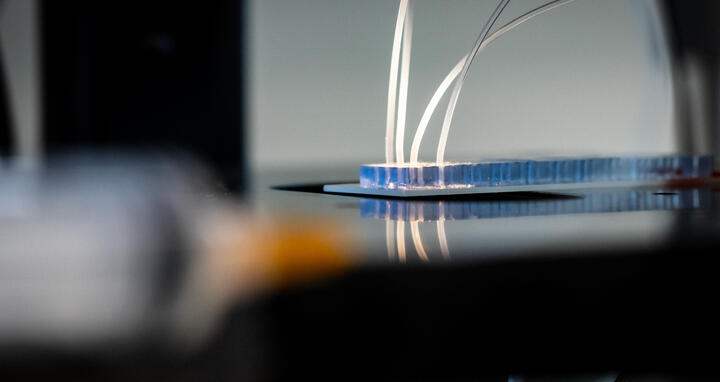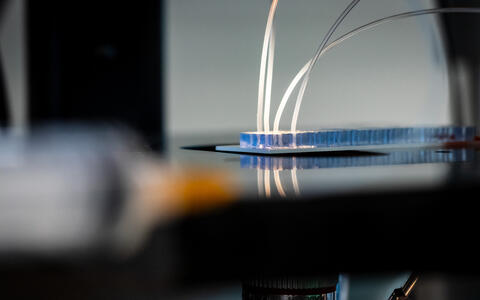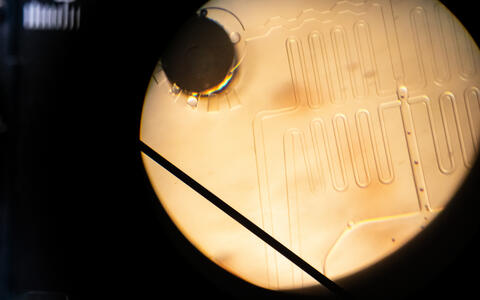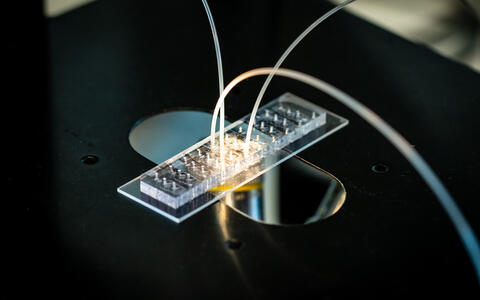A leap into the future with Virchow
“When cells make the wrong decision, diseases ensue.” This insight comes from the pioneering Berlin pathologist Rudolf Virchow, whose 200th birthday the city is celebrating this year. A vision for the future is now picking up where this great tradition left off and aims to take it a step further. “We want to develop cell-based medicine using the latest technologies and techniques. These include groundbreaking single cell and imaging methods, which we will combine with artificial intelligence and personalized disease models such as organoids,” says Professor Nikolaus Rajewsky, who, as Scientific Director of the Berlin Institute for Medical Systems Biology (BIMSB) of the Max Delbrück Center for Molecular Medicine in the Helmholtz Association (MDC), is coordinating the initiative. “This approach will allow us to use the first cellular changes to diagnose diseases, predict possible disease trajectories and steer the molecular networks away from the emerging disease and back toward a healthy equilibrium. It will also enable us to identify entirely new targets for therapeutic agents and cell therapies.”
“Such medicine enables targeted corrective intervention very early on – always using the most effective treatment. This would significantly improve the prognosis for many patients,” says Professor Angelika Eggert, who heads the Department of Pediatric Oncology and Hematology at Charité – Universitätsmedizin Berlin. This initiative ensures that the vital link between basic research and clinic practice is established. “We want to intercept the course of the disease before irreparable damage occurs and detect therapy resistance sufficiently early.”
A unique constellation of regional players
The Berlin metropolitan area offers an outstanding environment for putting diagnostics, the development of personalized therapies and the search for promising avenues for therapeutic agents on a completely new footing, making these scientific undertakings more efficient, faster and more cost-effective. This is because the area is home to a constellation of regional players from basic research, clinical medicine and application-oriented R&D that is not only unique in Germany but also includes global leaders in the relevant technology, data science and medical fields.
Experts from systems biology, medicine, biotechnology, physics and computer science/artificial intelligence want to team up with partners from local and national industry to build an AI-driven biomedical innovation ecosystem that will bring cell-based medicine to the clinic. The network also aims to create a favorable environment for spin-off businesses and a support platform to involve established companies. Some 15 pharmaceutical and biotech companies as well as AI start-ups and investors are already supporting the initiative. Core partners for the proposed Future Cluster are the MDC, Charité, the Berlin Institute of Health at Charité (BIH), the Zuse Institute Berlin (ZIB) and the Berlin Institute for the Foundations of Learning and Data (BIFOLD), a Berlin research network that develops applications for big data and machine learning.
“Recent examples of machine learning and artificial intelligence show that these novel approaches can make a significant contribution to medicine,” says Dr. Tim Conrad, head of the Department of Visual and Data-centric Computing at the Zuse Institute Berlin and project leader at BIFOLD. “Through the development of specialized algorithms and the necessary mathematical analysis, we will ensure that the methods developed and results obtained are verifiable and interpretable.”
Interested persons and potential partners can learn more about the proposed cluster – and join the initiative – at a Health Capital webinar on May 26, 2021, or at the kick-off symposium of the BIH and MDC’s Single Cell Focus Area on May 20, 2021.
The Clusters4Future competition
Under the umbrella of the High-Tech Strategy 2025, the German Federal Ministry of Education and Research (BMBF) seeks to strengthen knowledge and technology transfer through the open-topic competition Clusters4Future. It aims to foster optimal collaboration in a region among different actors from science, academia, industry and society. The German government plans to provide up to €450 million in total funding over the next 10 years for the Future Clusters.
In the second round of the competition, scientists were called on to submit proposals from their chosen field, such as robotics, energy or biomedicine, for the creation of regional innovation networks – the so-called Future Clusters – by mid-February 2021. An independent jury of experts has now selected the best 15 of the 117 cluster ideas to participate in the conception phase. The BMBF is supporting this six-month phase with up to €250,000. The only finalist from Berlin is “Virchow 2.0 – Creation of an innovation cluster to implement cell-based medicine in Berlin.”
In the conception phase, the participants will develop cluster strategies and projects for the first implementation phase. In mid-2022, up to seven Future Clusters from the second round of the competition will be selected based on the vote of an independent jury of experts. These Clusters will be able to implement their concepts for up to nine years. Up to €5 million in funding is available per cluster and year.
Further information
- Webinar on May 26, 2021: Cluster meets | Virchow 2.0 – implementing cell-based medicine in Berlin
- Press release by the BMBF: Karliczek: We’re supporting the innovation networks of tomorrow (German only)
- Clusters4Future initiative of the BMBF (German only)
- Clusters4Future website (German only)
- Berlin to become home to “Cell Hospital” (German only)
- Single Cell Approaches for Personalized Medicine – a joint focus area of the MDC, Berlin Institute of Health (BIH) and Charité
Downloadable images
Researchers isolate individual cells from tissues and transfer them into miniaturized chips for analysis. Photo: Felix Petermann, MDC
Magnification of the miniature chips: Individual cells are encapsulated in tiny droplets and treated with reagents to enable further processing. Photo: Felix Petermann, MDC
Contacts
Prof. Nikolaus Rajewsky
Scientific Director of the Berlin Institute for Medical Systems Biology (BIMSB)
Max Delbrück Center for Molecular Medicine in the Helmholtz Association (MDC)
+49-(0)30-9406-2999 (office)
rajewsky@mdc-berlin.de
Prof. Angelika Eggert
Director of the Department of Pediatric Oncology and Hematology
Charité – Universitätsmedizin Berlin
+49-(0)30-450-566-132
angelika.eggert@charite.de
Jutta Kramm
Head of Communications
Max Delbrück Center for Molecular Medicine in the Helmholtz Association (MDC)
+49-(0)30-9406-2140
jutta.kramm@mdc-berlin.de or presse@mdc-berlin.de
- Max Delbrück Center for Molecular Medicine in the Helmholtz Association (MDC)
-
The Max Delbrück Center for Molecular Medicine in the Helmholtz Association (MDC) is one of the world’s leading biomedical research institutions. Max Delbrück, a Berlin native, was a Nobel laureate and one of the founders of molecular biology. At the MDC’s locations in Berlin-Buch and Mitte, researchers from some 60 countries analyze the human system – investigating the biological foundations of life from its most elementary building blocks to systems-wide mechanisms. By understanding what regulates or disrupts the dynamic equilibrium in a cell, an organ, or the entire body, we can prevent diseases, diagnose them earlier, and stop their progression with tailored therapies. Patients should benefit as soon as possible from basic research discoveries. The MDC therefore supports spin-off creation and participates in collaborative networks. It works in close partnership with Charité – Universitätsmedizin Berlin in the jointly run Experimental and Clinical Research Center (ECRC), the Berlin Institute of Health (BIH) at Charité, and the German Center for Cardiovascular Research (DZHK). Founded in 1992, the MDC today employs 1,600 people and is funded 90 percent by the German federal government and 10 percent by the State of Berlin.








